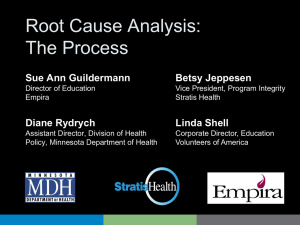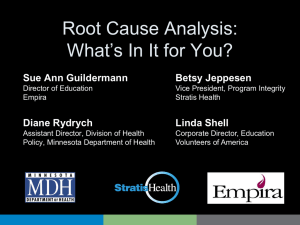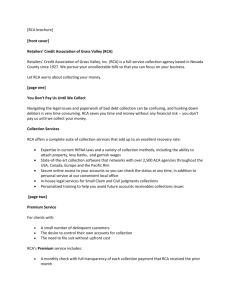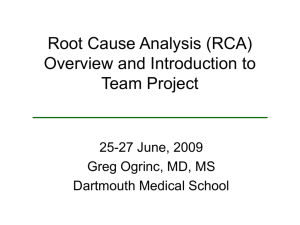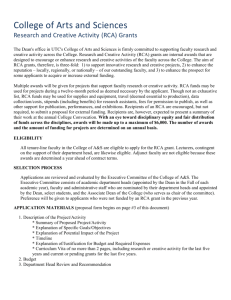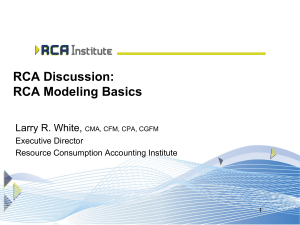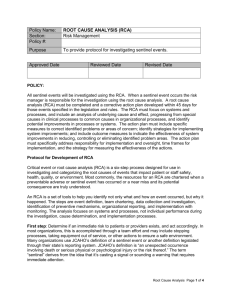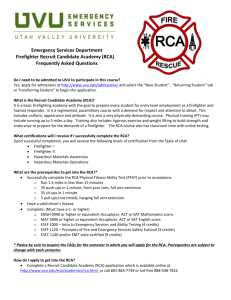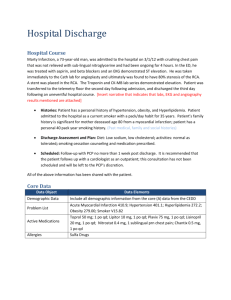Microsoft Word - Business Affairs Ltd.
advertisement
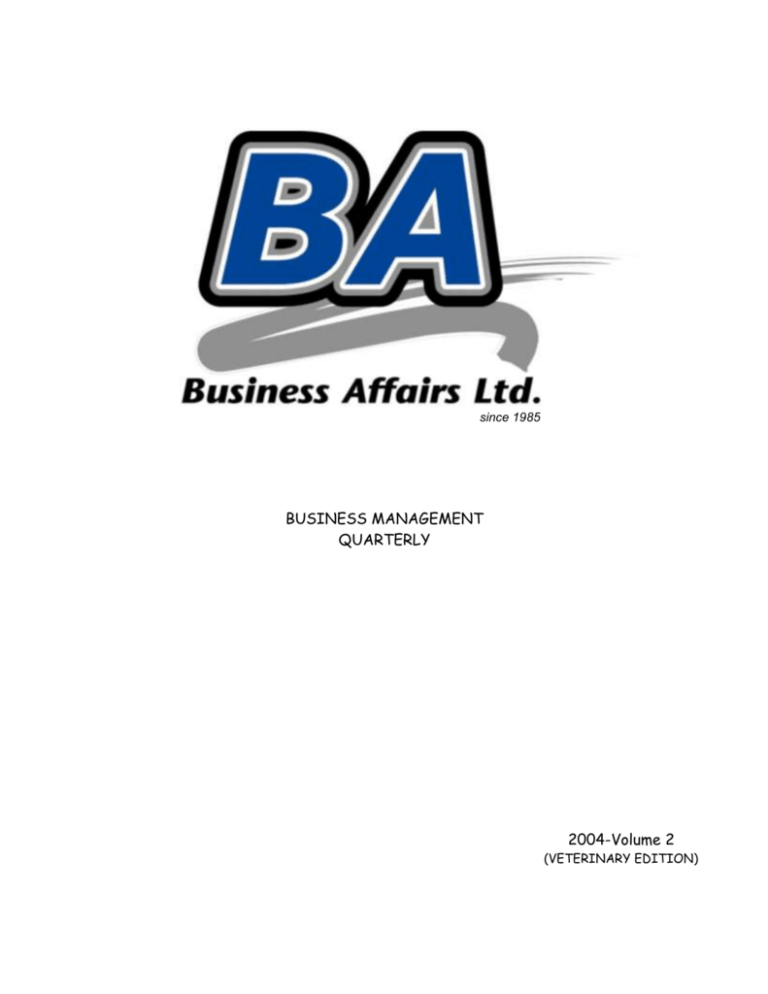
since 1985 BUSINESS MANAGEMENT QUARTERLY 2004-Volume 2 (VETERINARY EDITION) CLIENT SATISFACTION SURVEYS Over the past year many of our veterinary clients have participated in the OVMA client satisfaction survey. As a general rule, Business Affairs is wholeheartedly supportive of surveying clients. There is on occasion negative feedback received from these surveys. The initial reaction (it’s human nature) is to either become defensive or disillusioned with the practice’s service quality. cards and feedback forms accessible in the reception area all year long. Measure the feedback monthly so that you can continue to evolve with the changing needs and preferences of the market place. If you need any help in developing feedback forms or suggestion cards, please contact either our Mississauga (866-322-7022) or Barrie (800-3877021) office and ask for Norma Jean or myself (Frank). RETIREMENT COMPENSATION ARRANGEMENTS If your practice took part in such a survey, keep this in mind…nine out of ten disgruntled clients will not say anything to you and will just walk away. If this was the only gauge you had it would be difficult to improve upon your service level because you would only realize there was a problem when production starts to slide. If that occurs it can take years to reverse the trend. Over the past year we have been consistent in our message regarding the benefits of incorporation, be it Professionally or through a Technical Services Corporation. We have also touched on a couple of different cash flow strategies such as the use of Dividends as part of a compensation package and why an Individual Pension Plan is better than an RRSP. If you do receive negative feedback from a client satisfaction survey, consider it an opportunity. Someone out there is being honest with you and letting you know how they perceive your practice. Use that information to make positive changes. What you will no doubt notice over the next couple of years, assuming you are making those changes, is less negative feedback. In this issue we will look at another beneficial vehicle within the incorporated structure…the Retirement Compensation Arrangement (RCA). The information below was gathered from numerous financial planning websites. The OVMA is providing a great service by offering this feedback mechanism. Truth be known you should keep suggestion An RCA is an unregistered retirement plan established by a company to provide additional benefits to an employee of the company, payable on or after the employee’s retirement, loss of office or employment. It is funded by and taxdeductible for the employer or company. Every dollar contributed by the company or employer, earned or gained through growth in value, is held in trust, half in a refundable tax account, and half in your RCA trust account. Upon retirement, these funds are paid out and taxed at your post–retirement tax rate. Canada Revenue holds the non-interest-bearing refundable tax account until your payments begin. The funds in your RCA can be invested by the Trustee in a full range of investment vehicles. If you are earning a high income and want to increase your security or protect yourself from corporate insolvency, an RCA is a flexible, secure and tax-effective tool. It offers flexibility in funding, in the investment strategy for the funds in the trust, and in the dispersal at time of payout. Also, it is protected from future management or new company owners in the event of succession, mergers or acquisitions. There are no restrictions on the types of investments an RCA can hold. The way in which your RCA is funded will make a significant difference to the security, tax effectiveness, and borrowing power that it provides. The four principal funding approaches are: 1. Fully funded at set-up 2. Contributions over time 3. Using letters of credit 4. Using eligible life insurance plans Benefits of an RCA for the company include: contributions to an RCA are not subject to payroll tax incentive for key employees - an RCA can play an important role in attracting and retaining high calibre employees Benefits of an RCA for the employee include creditor-proof - since plan assets are separate from company assets, they are protected from the company’s creditors Though in general, Business Affairs is in favor of all financial planning vehicles, the RCA is third on our list of preferences because half of the contributions to an RCA is not able to appreciate. Though, some of this disadvantage may be able to be overcome because the RCA is not a registered pension plan and therefore, is not limited by the same contribution rules of a registered pension plan. By the way, if you are wondering what our two most preferred financial planning vehicles are with a corporation…Universal Life Insurance and Individual Pension Plans. Please call the Mississauga office (866322-7022) and ask for Frank if you would like more information regarding UL’s, IPP’s or RCA’s. ONTARIO BUDGET Are you aware of how the recent provincial budget affects you or your practice? As a tax payer please be aware OHIP will no longer cover “regular” eye exams (if you are between the ages of 20 and 65), physiotherapy (all ages) and chiropractor visits (all ages). As a business owner you need to be aware you will be collecting a new tax on behalf of the provincial government. The recent budget re-introduced health premiums. Employees will begin paying this tax on July 1. For those of you preparing payroll through a payroll software, you will have to ensure to download the new payroll tables after completing your final payroll for June. ONE STOP SHOP Over the past year we have teamed up with strategic partners from every facet of business, financial and legal planning. On the financial planning side, we are working closely with Mark O’Farrell of Strategic Edge. Mark has numerous financial planning designations and is a Universal Life Insurance specialist. He has developed a very unique strategy for Universal Life Insurance within a corporation as a means of retirement planning. In terms of Business Law, we have teamed up with Tracy Fleck, LLB, LLM. Tracy has significant experience in the healthcare industry and has opened up her own office since leaving Borden Ladner Gervais LLP. We turn to Tracy when looking to set up “Buy-Sell”, Partnership or Shareholder agreements. And finally, with respect to tax law we are working closely with John David Buote, MBA, MST (Taxation), LLB. John focuses specifically on tax law and is a tremendous resource when developing complicated financial planning strategies. Given, Business Affairs’ breadth of resources, please do not hesitate to contact us should you have any comments, questions or concerns regarding practice, business, corporate or financial planning issues. In fact, prior to implementing any of these strategies we suggest you do contact us to ensure all options are exhausted and all benefits are maximized. TAX, TIPS AND TRAPS Don’t forget to checkout our latest issue of T, T and T.

